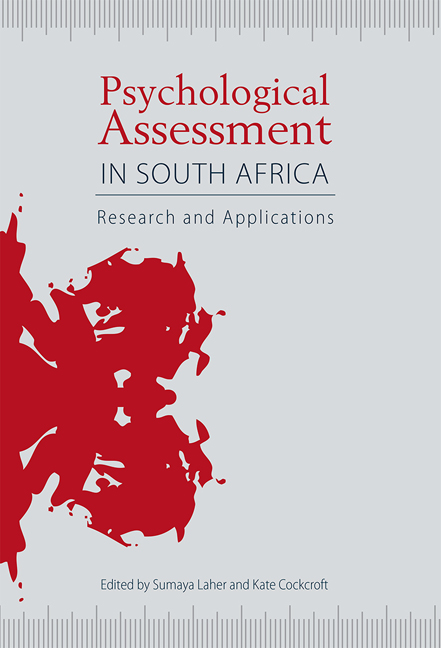Book contents
- Frontmatter
- Contents
- Tables and figures
- Acknowledgements
- Acronyms and abbreviations
- 1 Contextualising psychological assessment in South Africa
- Section One Cognitive tests: conceptual and practical applications
- Section Two Personality and projective tests: conceptual and practical applications
- Section Three Assessment approaches and methodologies
- 28 Ethical perspectives in assessment
- 29 Using computerised and internet-based testing in South Africa
- 30 The ImPACT neurocognitive screening test: a survey of South African research including current and projected applications
- 31 A family consultation model of child assessment
- 32 Qualitative career assessment in South Africa
- 33 Psychological assessment and workplace transformation in South Africa: a review of the research literature
- 34 Assessment of prior learning: a South African perspective
- 35 Large-scale assessment studies in South Africa: trends in reporting results to schools
- 36 Current and future trends in psychological assessment in South Africa: challenges and opportunities
- Contributors
- Index
32 - Qualitative career assessment in South Africa
from Section Three - Assessment approaches and methodologies
Published online by Cambridge University Press: 21 April 2018
- Frontmatter
- Contents
- Tables and figures
- Acknowledgements
- Acronyms and abbreviations
- 1 Contextualising psychological assessment in South Africa
- Section One Cognitive tests: conceptual and practical applications
- Section Two Personality and projective tests: conceptual and practical applications
- Section Three Assessment approaches and methodologies
- 28 Ethical perspectives in assessment
- 29 Using computerised and internet-based testing in South Africa
- 30 The ImPACT neurocognitive screening test: a survey of South African research including current and projected applications
- 31 A family consultation model of child assessment
- 32 Qualitative career assessment in South Africa
- 33 Psychological assessment and workplace transformation in South Africa: a review of the research literature
- 34 Assessment of prior learning: a South African perspective
- 35 Large-scale assessment studies in South Africa: trends in reporting results to schools
- 36 Current and future trends in psychological assessment in South Africa: challenges and opportunities
- Contributors
- Index
Summary
The history of career assessment spans more than a century, with its origins in the early 1900s. It is a history that is recursively related to the development of career theory and practice. Thus the philosophy of career assessment reflects and informs the career psychology discipline of the times. The predominant approach to career practice through most of the last century was a directive, matching approach resulting from a focus on quantitative career assessment. There is also a long history to qualitative career assessment, but it is a history that has been subsumed by the dominant story of quantitative career assessment (McMahon, 2008; McMahon & Patton, 2006). The first part of this chapter provides an overview of quantitative career assessment and then introduces qualitative career assessment. The second part of the chapter focuses on a qualitative career assessment instrument that has been developed in South Africa, the My System of Career Influences (MSCI) reflection process, beginning with an introduction to its theoretical foundation, the Systems Theory Framework (STF) of career development.
Quantitative career testing
De Bruin and De Bruin (2006) make an important distinction between the words ‘testing’ and ‘assessment’. Psychological testing means just that – the administration, scoring and collating of tests, which in career counselling could involve abilities, interests, values and personality traits. Assessment, on the other hand, is a broader, more holistic concept which is inclusive of but not limited to psychological testing. Assessment reflects a process of giving meaning to information (psychometric or otherwise); it promotes greater career and selfexploration in a client. This section describes testing in career counselling, while the next section examines the role of assessment in career counselling.
Much of the history of career psychology has reflected on the dominant role of testing. There is general agreement that the dominant role of career testing evident internationally is similarly reflected at a national level. Lamprecht (2002, p.121), for instance, states that career counselling in South Africa has ‘over the last 50 years been dominated by the practice of standardised, psychometric tests’.
- Type
- Chapter
- Information
- Psychological Assessment in South AfricaResearch and Applications, pp. 474 - 487Publisher: Wits University PressPrint publication year: 2013



